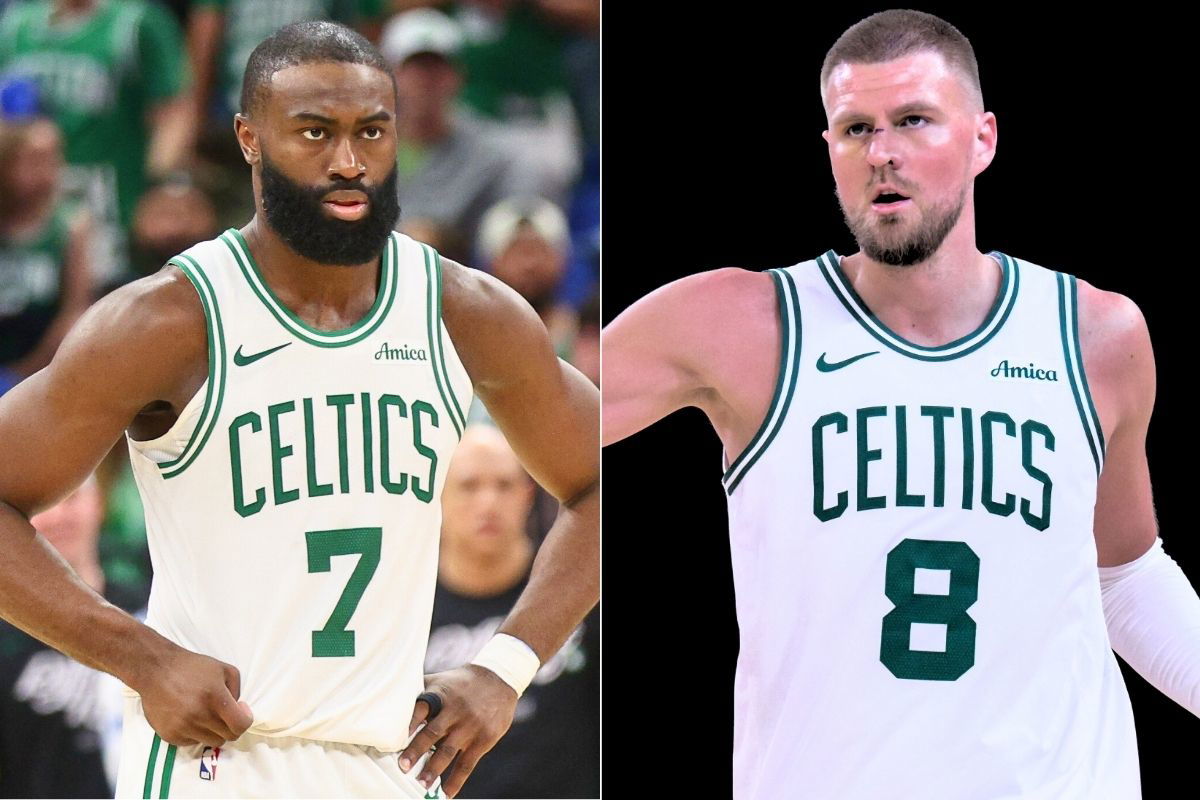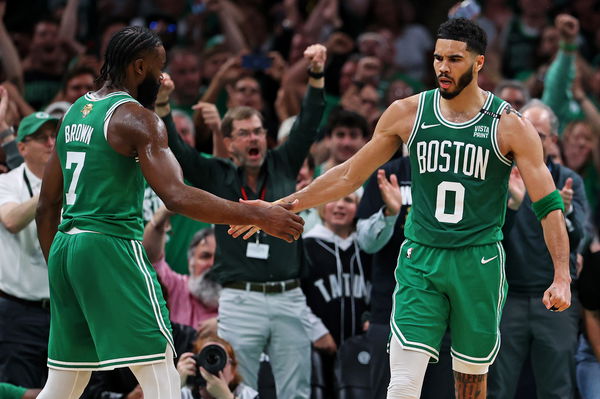
Imago
Image Credits: Imagn

Imago
Image Credits: Imagn
Something’s broken in Boston. You can feel it. This isn’t the same Celtics team that steamrolled through the regular season and looked like world-beaters just a week ago. Two games into their series against the Knicks, the defending champs are down 0-2, staring into the abyss after another shocking collapse on their home floor. The swagger? Gone. The invincibility? Shattered. And if you don’t believe it, listen to the players themselves – Kristaps Porzingis and Jaylen Brown confirmed it loud and clear, things have changed, and maybe not in the way anyone expected.
Watch What’s Trending Now!
Game 2 was supposed to be the response, the Celtics flexing their muscles after dropping the opener. Instead, it was déjà vu all over again, maybe even worse. They built another huge 20-point lead, looking comfortable, looking like the champs. And then… they just stopped. They stopped scoring, stopped executing, and stopped looking like they even belonged on the same court as the Knicks down the stretch.
After a loss like that, you expect frustration, maybe some defiance. You don’t expect Kristaps Porzingis, the significant offseason acquisition meant to put them over the top, basically shrugging and saying the pressure’s off now. “Well, in a way, it kind of takes all the pressure off of us, no?” Porzingis mused post-game. “Like, now… I don’t know if you’ve checked the odds—maybe the Knicks are the favorites now, who knows. We were expected to win, so for us to be in this hole right now, with our backs against the wall, we have nothing to lose.“

USA Today via Reuters
Jun 17, 2024; Boston, Massachusetts, USA; Boston Celtics forward Jayson Tatum (0) celebrates with guard Jaylen Brown (7) after a play against the Dallas Mavericks in game five of the 2024 NBA Finals at TD Garden. Mandatory Credit: Peter Casey-USA TODAY Sports
It’s a stunning admission. Is this genuine belief that they play better as underdogs, a psychological trick to convince themselves, or is it a subtle acknowledgment that the weight of being defending champs, expected to cruise, was maybe too heavy? Saying “nothing to lose” when you’re the defending champs down 0-2 feels like a radical, almost desperate, reframing of reality.
Porzingis didn’t stop there, revealing he’s far from 100%, adding another layer of grim reality. “I’m dealing with something,” he admitted, confirming suspicions after looking sluggish and coming off the bench. “I’m just not feeling my best. I’m not feeling my best at all, but it just kills me inside that it’s happening at this moment.” This context makes his “pressure’s off” comment even more complex – perhaps it’s easier to feel less pressure when you physically can’t perform at your peak.
He acknowledged the reality, “I mean, we’re definitely in a tough situation. You know, it’s… we’re down 0-2.” But he tried to inject some hope, adding, “But again, I’ve been in these situations—on both sides… The momentum can change. Nobody feels sorry for us. We have to go out there and take it—each game, one at a time.” It’s the necessary veteran speak, but the underlying message is clear: the confidence is shaken, the physical limitations are real, and the path forward is incredibly steep.
Jaylen Brown echoed that “backs against the wall” sentiment, but framed it as a test of character. Asked how they turn this disaster around heading to New York, his answer was starkly simple “Each other.” No talk of tactical adjustments or shooting variance, just leaning on internal fortitude. Is that enough against a Knicks team playing with this much cohesion and force? He acknowledged the immediate pain, admitting, “It should sting. Let it sting for the night.” This suggests an understanding that simply ignoring the failure isn’t productive; the frustration needs to be felt, at least momentarily.
However, Brown quickly pivoted to the required mental gymnastics needed for playoff survival. “And then tomorrow’s a new day—you move forward. Short-term memory,” he declared forcefully. The narrative has undeniably shifted from assumed dominance to desperate survival. For Boston, facing health issues, confidence crises, and a tougher-than-expected opponent, nothing feels the same as it did just a few days ago.
Tatum’s turnover & other nightmares: what went wrong (again)?
Okay, the mindset shift is noted, but why are the Celtics actually collapsing? Let’s dig into the tape. Tactically, their late-game offense has become painful to watch – stagnant, predictable, and reliant on tough, contested shots. Instead of flowing, moving the ball, and leveraging their multitude of weapons, they repeatedly devolved into Tatum or Brown isolation plays against a Knicks defense that was clearly prepared.
This offensive stagnation leads directly to the leadership question, because frankly, Tatum and Brown haven’t looked like the composed leaders of a defending champion under duress. Forget just the shooting percentages (Tatum’s 5-for-19, Brown’s 8-for-23 in Game 2); their decision-making has been shaky. Tatum, in particular, struggled mightily to create space against OG Anunoby’s defense, with the Knicks fighting hard to prevent switches onto weaker defenders. His only first-half basket in Game 2 was uncontested.
That final turnover, dribbling into traffic with the game on the line, was simply inexcusable for a player of his stature. Both stars seemed caught between being hesitant and forcing the issue. Their body language screamed frustration, not control. When the game got tight, neither star consistently made the right play.
Joe Mazzulla isn’t immune to criticism either. While players execute, the coach dictates strategy and manages the flow. Was he too slow with timeouts during the Knicks’ furious rallies? Did the offensive sets become too predictable, allowing Thibs’ defense to anticipate and disrupt? His explanation for not calling timeout on the final play of Game 2 – wanting the same action that led to Tatum’s dunk earlier – ignores the reality that the Knicks’ defense was fully set and anticipating. Sometimes you need to draw something up.
Furthermore, the rotation choices were curious. Porzingis, clearly hampered by not feeling well, came off the bench and played just five ineffective minutes in the first half (0 points, 1 rebound, 0 shots). Bringing in Luke Kornet before him raised eyebrows. Even the attempt at a “Hack-a-Mitch” strategy backfired when the Knicks simply subbed Robinson out. Right now, it feels like the Celtics lack a clear, adaptable offensive identity in crunch time, and that points to potential shortcomings in coaching adjustments and game management.
Historically speaking, the Celtics are in deep trouble. Defending champions losing the first two games of a series at home is exceedingly rare and almost always fatal. While teams have overcome 0-2 deficits, the context here – the home losses, the nature of the collapses, the struggles of their stars, the key injury/illness – puts them in nearly unprecedented territory for a team of their caliber.
So, where does that leave Boston? They are in deep trouble which is why they must find answers – tactical, mental, physical – immediately. Because heading into a roaring Madison Square Garden down 0-2 against this Knicks team, playing this brand of relentless basketball? Nothing is the same, and Boston is completely out of time for excuses or gradual adjustments. It’s win starting Friday, or face a truly stunning and embarrassing end to their title defense.

